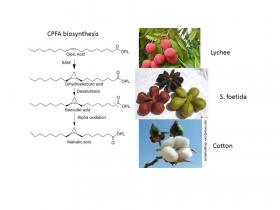Technologies Available for License
Categories: biotechnology & healthenvironment
2013-028: Renewable chemical feedstock
Invention: 2013-028
Patent Status: U.S. Patent Number 10,351,868 was issued on July 16, 2019
For technical and licensing related questions, email tcp@bnl.gov.
Summary

Synthesis of Cyclopropane Fatty Acids (CPFA) and Illustrations of Natural Sources of CPFAs
Fatty acids (oils) from the seeds of oilseed crops such as soybeans, sunflower and etc. are processed into vegetable oil for consumption and food preparation. Seeds of other plants naturally contain specialty fatty acids, called "modified fatty acids" ("mFAs"), that are useful as chemical feedstocks, replacing chemicals otherwise obtained from petroleum. Unfortunately seeds of these plants are not amenable to being grown and harvested in commercially relevant amounts. Thus, there has been considerable effort devoted to developing altered oilseed crops that efficiently produce modified fatty acids. The present technology provides means to produce fatty acids having a cyclopropane ring, which makes the oil extremely useful for chemical processing into such products as plastics, paints, dyes, coatings and the like. This technology exemplifies how normal oilseed crops can be modified to produce valuable chemicals. In addition to being renewable, production of such chemicals in plant seeds is environmentally safe and clean.
Description
The present technology provides modified oilseed crops having increased amounts of a non-native, modified fatty acid compound of interest. The system involves transformation of a crop plant with a gene encoding a synthase or encoding a fatty acid modifying enzyme specific for the mFA of interest and an acyltransferase gene and expressing both genes in the transformed plant. Specific embodiments include synthase genes or fatty acid modifying genes isolated from source plants that normally accumulate elevated amounts of the particular mFA. Preferred embodiments of the technology include acyltransferases that transfer either the substrate for the synthase enzyme or transfer the modified fatty acid of interest to, for example, monoacyl- or diacylglycerol. Preferably, acyltransferase genes are obtained from source plants that normally accumulate elevated amounts of the mFA of interest. Manipulation of the accumulation of the proper substrate for the synthase or FA modifying enzyme was useful in preferred embodiments. Enzymes that compete for the synthase or modifying enzyme substrates are suppressed by genotypic and phenotypic mutation of genes encoding the competing enzymes. A particular embodiment of the invention focuses on generating transformed plants accumulating elevated amounts of cyclopropane fatty acids (CPFAs). CPFAs are of particular interest because the presence of the cyclopropane ring creates a reaction center for facile synthesis of branched chain fatty acids. The optimal CPFA synthase may depend on the targeted crop plant. In some embodiments, an Escherichia coli cyclopropane fatty acid synthase was a preferred choice. Acyltransferase genes were selected from the group consisting of lysophosphatidic acid acyltransferase (LPAT), Phospholipid Diacyl Glycerol Acyl Transferase acyltransferase (PDAT) and diacylglycerol acyltransferase (DGAT) genes. A Sterculia foetida LPAT gene provided a particularly preferred embodiment.
Benefits
Modified fatty acid compounds are useful for industrial processes. Obtaining high value compounds from plants rather than from petroleum products is a "green technology" business opportunity. The successful implementation of this technology will be the kernel of a major sustainable future industry. Unlike 'biofuels' this technology creates value-added crop seeds that will command a high price. Because the infrastructure already exists for planting, harvesting and isolation of specialty seeds, profit margins for these valuable seeds will be higher than those typical in this sector.
Applications and Industries
In the particular example developed in this case, the cyclopropane fatty acids can be processed into lubricants, plasticizers, coatings and many other compositions. The more general ability to create crop seeds having other desirable modified fatty acids will find applications in similar arenas.
Journal Publication & Intellectual Property
Contacts
-

Poornima Upadhya
Manager Technology Transfer & Commercialization
Technology Commercialization
(631) 344-4711, pupadhya@bnl.gov
-

Avijit Sen
IP Licensing & Commercialization
Technology Commercialization
(631) 344-3752, asen@bnl.gov




